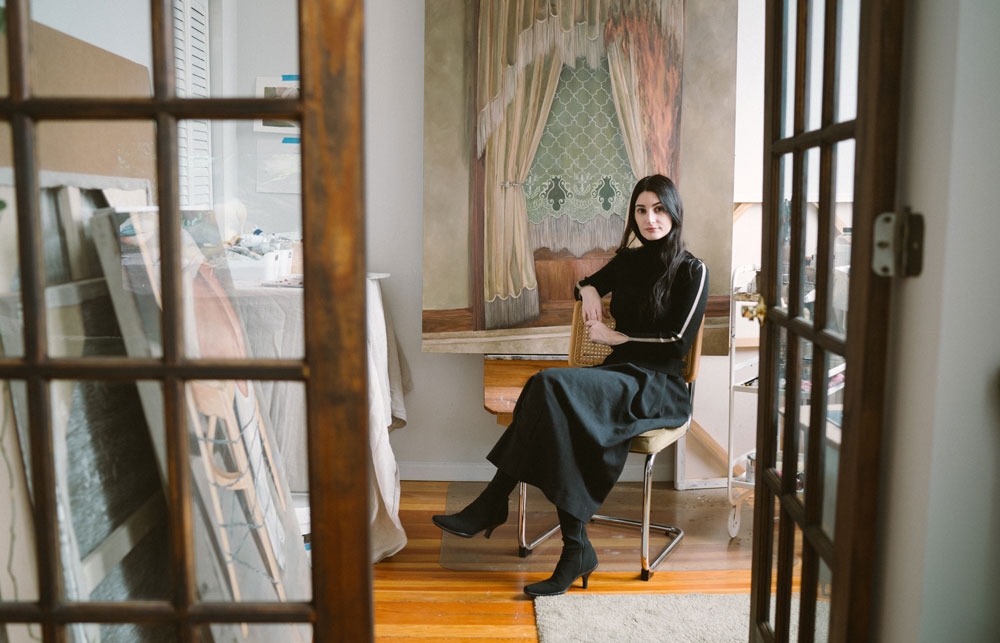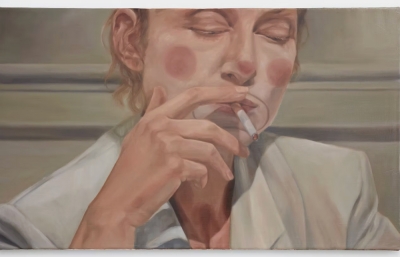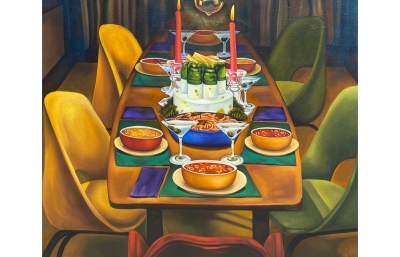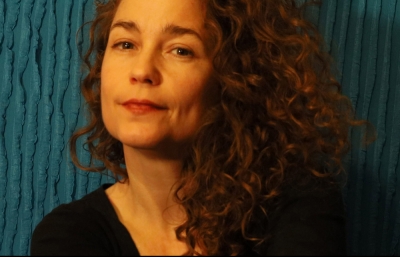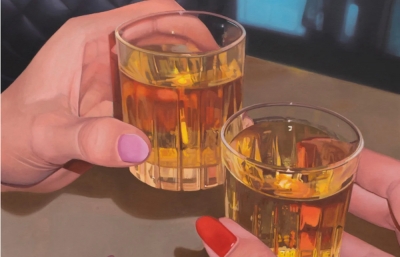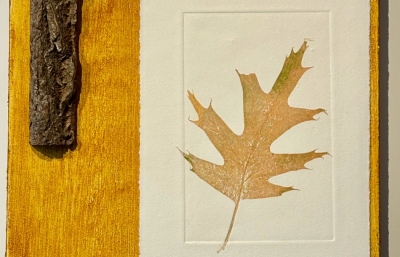Noelia Towers
Empathy and Enlightenment
Interview by Gwynned Vitello // Portrait by Alexa Viscius
A successful short story may be a writer’s greatest challenge. There’s no space for meandering, verbose flourishes, a cast of characters, and the landing has to stick. Only a confident voice can frame the hook, invent that memorable protagonist, and concoct a twist that grabs the viewer. Noelia Towers is a master of such impact, but she does it with oils on a single canvas, usually painting a solitary subject, whether a fraught pair of hands, a partially obscured face or a decaying bouquet of flowers. Unexpected vantage points, bold color choices and focused specificity seduce us in an invitation to join her as collaborators in this collective mystery of life, love and longing. Like lucky readers of a good short story, we get to engage with vulnerability, conflict, and mystery in Noelia’s beautiful, haunting portrayals.

Gwynned Vitello: I feel that there’s an absolutely unblinking honesty about Spanish portraiture. It’s never prettified or sentimental. Being a native of Barcelona, I wonder if you agree with me. Do you feel that Spanish blood in your art?
Noelia Towers: As a Catalonian with a deep sense of the complexities surrounding our identity and history, my perspective is marked by the struggle and tension inherent in our region’s relationship with Spain, particularly its historical association with fascism.
While Spanish portraiture may possess a raw and unfiltered honesty, it’s essential to acknowledge how Spain’s history, especially its dark period under Franco, casts a long shadow over its cultural expressions, including art. For many Catalonians, myself included, this history evokes feelings of pain, oppression, and a desire to assert our distinct identity separate from Spain’s authoritarian past. There is a raw authenticity and unfiltered honesty often present in Spanish art that sets it apart from more idealized and romanticized styles of other places and time periods, and I admit that being away from home for such a long time has gifted me with a new outlook surrounding my homeland, making me more accepting of the nuances of my heritage.
Were you exposed to art by circumstances growing up? Barcelona is romanticized for the Gothic center and Gaudi architecture, but what was it like for you growing up?
I grew up in an environment that lacked cultural exposure. My parents, not by choice, were unable to provide a rich literary or artistic environment due to their own upbringing. Our home had no books, but my thirst for knowledge led me to the local library, where I discovered a world beyond my immediate surroundings. My maternal grandfather stood out as the most cultured individual in the family. As a cinephile and enthusiast of music and theater, he became my guide in the realm of the arts. I fondly remember my local church sparking my interest in creativity. The intricate stained glass surrounding the building, the captivating limestone sculpture standing behind the altar, and the majestic vaulted ceiling—every detail stimulated my senses and fueled my imagination. Although I might romanticize those memories, the impact of having such a beautiful sanctuary a block from my childhood home was profound. Living in Barcelona, I was surrounded by beauty, but I didn’t fully appreciate it until I left. Now I marvel at the city’s magnificence like a tourist captivated by its grandeur.

When did you realize you wanted to make art? I know your family wasn’t able to send you to art school, but you did seem to get encouragement from your mom, right? Do you think your background gave you more sensitivity to human struggles?
I would always be drawing in my room or using any materials available around the house to entertain myself. I had been begging for lessons, and when I was around six, my mom found this grassroots community center where they offered painting classes. I’m grateful for the emotional support my family provided, since it’s rare within the dynamics of our household—but they never once doubted my passion for the arts.
Coming from a family riddled with financial struggles actually stimulated my creative side. You have to make things work with whatever you have at your disposal, and my upbringing provided me with a more empathetic world view. Early on, I was able to recognize other people’s struggles in a way that growing up in a privileged environment wouldn’t have granted.
You’ve admitted to turning away from art during your teenage years, though I bet it wasn’t for long? Were you just hanging out? Was it music? What brought you back?
My teens were incredibly intense, something I don’t really like to talk about because it’s hard to fathom someone so young having such life-altering experiences, and whenever I speak about it, it feels like I'm narrating someone else’s life, not mine. So briefly, I quit art when I was around 13 and went down a very dark path. Sometimes I think it’s a miracle I survived, skipping school, partying, and attending concerts. I played in bands, organized shows, and hosted bands from all over—all things a young adult might do, except I was extremely young and naive. One day I felt a massive void and realized something big was missing. I took my box of oils out of teenage angst retirement and started painting again, horrendous ones that still hang in my grandpa’s apartment to my embarrassment, and it was one of the best decisions of my life.
When you finally attended art school, was it what you expected? Do you feel you developed a style, or at least an idea of what you wanted to express?
The art school I attended isn’t the same as those in the USA. Back home, once you finish high school, you have to go through what’s called Bachillerato for two years, then pass a final exam before you can attend vocational training or college. I chose the art branch, which did reignite my passion for painting; however, we were more focused on art history, philosophy, technical and live drawing, graphic design, and audiovisuals, which helped me gain a broader knowledge and inspired me to try different mediums. It complicated things in such a way that I wanted to do it all. It was a bit overwhelming, but very informative.

And then a big move to Chicago? What brought that about, and how did you adapt? It’s such a big, modern city. How did you begin to establish yourself?
Moving was not on my bingo card, but I met my American husband in Barcelona and decided to make the big move. Everything fell into place, and I’m so happy it worked out so well. I was blessed with insane adaptability skills from birth and have always adjusted to things (even though change scares me!). Some incredible people enriched me and opened doors, and I’m forever grateful.
A huge life changer which you have been very open about is the diagnosis of ulcerative colitis. If you don’t mind talking about it, how did it affect you?
It was the most frightening thing to go through. I’ve always had stomach issues related to stress, which all started in childhood. It got worse when I was around 18 and trapped in an abusive relationship that almost ended me. My first severe UC symptoms occurred when I was 21, visiting a remote place in Thailand. During dinner, I went to the restroom, where I was shocked by a surge of blood, like I was having a miscarriage. It actually looked like a crime scene, and I didn’t know what to do… at a place only reachable by boat! I survived the night and returned home, only to undergo continuous agonizing experiences with neglectful medical professionals. I’ll never forget the pain and lack of care I received. It’s been 11 years and many flare ups, but I’ve learned so much about my body.
I feel like it manifests so much in your work, just on the basic level of things not appearing as they seem at first, like a strong, beautiful woman in handcuffs or holding a bouquet of flowers and scissors.
I used to paint other people, sometimes friends, and often I still do. I wanted to share certain aspects of my life without giving away too much, and a way to accomplish that is by making the figures I paint appear to be mysterious and ambiguous.
I think the blank or hidden face is a very effective way to portray a personal story, as well as a method of making it universal so that a viewer can see themselves or others. Tell us more about her choice to frequently obscure the face.
If I don’t show you a face, it could really be anybody. It makes the narrative of the work less about me and more about how the viewer feels when looking at them, and it may also make the work more relatable. I love painting faces and really miss doing so. There's so much raw power in facial expressions; you can convey so many emotions. Yet I don’t always want to give said emotions away, but I wish for people to connect in their own manner without telling them how they’re supposed to feel. Sometimes a painting isn’t what I’m trying to say, but a mirror for whatever people want to project on it.
We know that in conversation, especially as portrayed in movies, what is unsaid is just as potent as what is spoken. I almost feel like that is similar to what we see when someone walks away. You paint many pictures where we see the subject from behind. Why are you drawn to that aspect?
Viewing a subject from the back evokes mystery and introspection, as well as anonymity, leaving room for interpretation. I like themes of departure, solitude, loss, despair, and instability, and I have found that seeing a figure facing the opposite way works quite well for me.

There are some motifs that appear, like your favorite characters in your paintings. Can you comment as to why you like to use them?
I guess these motifs are just aspects of my identity. It is important for me to create a universe of symbols for myself. However, I feel like people often focus too much on said symbols, trying too hard to decipher their meaning. It is essential for me to engage with the emotions embedded in my works. A lot of what I paint relates to premature loss of innocence, and the reason I love painting scissors so much is partly due to growing up with my grandmother, who was a seamstress and always had very beautiful scissors of all kinds and sizes around the house, which I found fascinating and dangerous, but so intriguing. Such a utilitarian object can embody much more than that. I have this visual of my child-like wonder being cut by one of the scissors I grew up around. Many of the objects I paint serve as vessels for memories, and I love how seemingly mundane objects and motifs can carry that weight.
We talked about you being your own model, but there are many paintings of other women. Are they all aspects of you? Then again, women have so many common experiences. Do you think it’s shared or generational? Or, to put it very simply, why do you like to paint women?
I paint women because I know womanhood and its nuances firsthand. Being a woman can look so different, depending on where in the world you’re born. I wish I could say every woman has the exact same lived experiences, but this wouldn’t be true; there are so many subtleties. Women’s lives are incredibly diverse, yet there are common threads that connect us. This is the reason I choose to bring forth what I know; it wouldn’t be fair to paint someone else’s story.
I’m guessing, especially as someone fairly new to Chicago, that you tend to view your practice as rather solitary, especially since you didn’t go to the local art schools or were mentored by someone there. Does that suit you, and maybe it is a form of what we call self care? And in your case, another aspect is your ongoing health issues.
After 10 years in Chicago, I can now appreciate the solitude that comes with my practice, but it feels incredibly isolating sometimes. I get into my head sometimes, and I am my own worst critic. There have been plenty of times I wished for more support from my fellow painters and artists. Not to be dramatic (I love being dramatic, actually), but I have felt like an outcast when it comes to the academic aspect. It’s rare to come across someone from the arts who hasn’t gone to art school, which leads to this sense of disconnect. It’s hard to reach out because of the constant fear of rejection or judgment, but I am slowly learning how to build up confidence. I also enjoy the feeling of being an outcast because I have never truly felt that I belonged anywhere, and I don’t mean this in a subversive way, but in the sense that my interests are so wide that I feel like I am made out of a bunch of pieces from different puzzles.
I used to have so much FOMO when I was younger, especially when my health issues wouldn’t allow me to partake in certain things, and I felt like Bart Simpson confined to his room, watching others have fun. Now that I’m older, I love missing out. I love being home with my husband and our cats, and I feel that a quieter life actually improves my health. I think living in the middle of nowhere would do wonders, but first I need to learn how to drive, just so I can return to civilization and hug my friends.

I’m sure you do a lot more than paint. I do know that you utilize photography, but is it an end in itself or part of your painting process?
I wish I had time to indulge in the things I enjoy, like photography, without feeling compelled to use it solely as a tool for painting. I love taking Polaroids for the immediacy they offer; it's so satisfying. Incorporating my own photography as a necessary step in my artistic process can feel incredibly tedious, to be honest, and I have really been enjoying image research, sourcing from the internet, old magazines, and books.
Are there other genres you’d like to explore? Or interests that you’ve been hiding? Do you love to spend time in the kitchen or get lost listening to old recordings? Do you feel you need to consume media or spend time outside to get inspired?
I’ve long had this idea of a more conceptual show that involves exploring something completely new to me, and I’m curious and scared at the same time. In my spare time, I also enjoy cooking food from the homeland, especially as a way to connect with it. I was an avid record collector for years, though I gave it all to my brother to sell when he was faced with some financial struggles.
I love trash TV, watching public meltdowns and the joy in knowing it doesn’t affect me in any form. I’ve also been doing pole fitness for over six years, as it seems to be the only exercise my body tolerates. Movement is so essential if you’re chronically ill. As for inspiration, oddly enough, I always find it when least expected. I get huge waves of creativity after reading a book, listening to a podcast, or obsessing over something obscure on Wikipedia. Everything in life is an endless source!
Tell me about your next show and any new subjects you might portray.
I have a show in Miami opening at Marquez Art Projects, my first institutional solo show, so I’m equally nervous and excited. The works aren’t as figurative as usual, and it felt really good to let go, allowing my work to speak in a different language. One of the pieces was actually the most fun I’ve ever had painting; it was really a delight.
What impresses me about Spain is how the people take such pleasure in their cities and gardens and being around each other. What’s the first thing you want to do when you go back to Barcelona?
That’s so funny because when I am in Barcelona, I want to spend as much time as possible outdoors, which is quite the opposite of how I feel in Chicago. The first thing I do each time I land in Barcelona is get some Catalonian food. It is imperative to eat something that tells my brain, “You’re home.”
Noelia Towers solo show at Marquez Art Projects, Night Visions, is on view through November 16, 2024.
Noeliatowers.com // This interview was originally published in our SUMMER 2024 Quarterly

